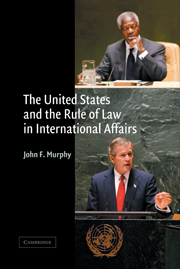Book contents
- Frontmatter
- Contents
- Acknowledgments
- Introduction
- 1 Law and legal process in international affairs
- 2 The status of international law under US law
- 3 UN dues
- 4 Use of force
- 5 Arms control, disarmament, nonproliferation, and safeguards
- 6 The law of the sea
- 7 The International Court of Justice
- 8 Prevention, prosecution, and punishment of international crimes
- 9 Human rights and international environmental issues
- 10 Summary and conclusions, and some possible future scenarios
- Index
8 - Prevention, prosecution, and punishment of international crimes
Published online by Cambridge University Press: 22 September 2009
- Frontmatter
- Contents
- Acknowledgments
- Introduction
- 1 Law and legal process in international affairs
- 2 The status of international law under US law
- 3 UN dues
- 4 Use of force
- 5 Arms control, disarmament, nonproliferation, and safeguards
- 6 The law of the sea
- 7 The International Court of Justice
- 8 Prevention, prosecution, and punishment of international crimes
- 9 Human rights and international environmental issues
- 10 Summary and conclusions, and some possible future scenarios
- Index
Summary
Introduction
“International crimes” is a concept of considerable definitional ambiguity. The eminent British international law scholar Georg Schwarzenberger, writing in 1950, concluded that “international criminal law in any true sense does not exist.” Defining international law narrowly to cover only those rights and obligations of states and not those of individuals, Schwarzenberger was of the opinion that “an international criminal law that is meant to be applied to the world powers is a contradiction in terms. It presupposes an international authority which is superior to these States.”
Turning to piracy and war crimes, the examples most often “adduced as evidence par excellence of the existence of international criminal law,” Schwarzenberger denied that these actions constitute crimes under international law. Rather, in his view:
The rules of international law both on piracy jure gentium and war crimes constitute prescriptions to States to suppress piracy within their own jurisdiction and to exercise proper control over their own armed forces, and an authorisation to other States to assume an extraordinary criminal jurisdiction under their own municipal law in the cases of piracy jure gentium and war crimes committed prior to capture by the enemy.
Most other commentators have arrived at a different conclusion. With respect to piracy the International Law Commission, a subsidiary organ of the UN General Assembly, in drafting the articles on piracy that ultimately helped constitute the 1958 Geneva Convention on the Law of the High Seas, adopted what Alfred Rubin has termed the “naturalist” model.
- Type
- Chapter
- Information
- The United States and the Rule of Law in International Affairs , pp. 284 - 324Publisher: Cambridge University PressPrint publication year: 2004



